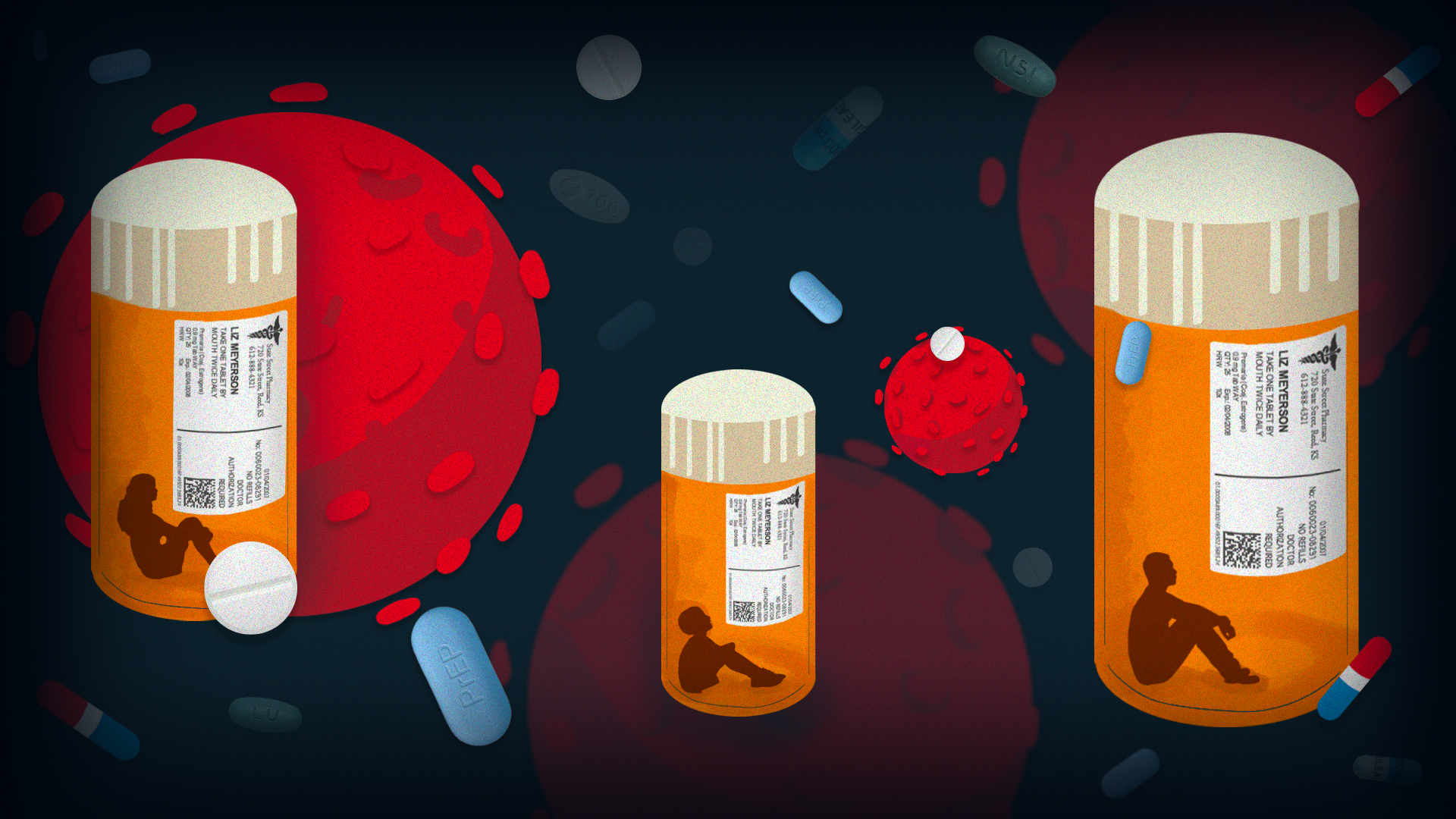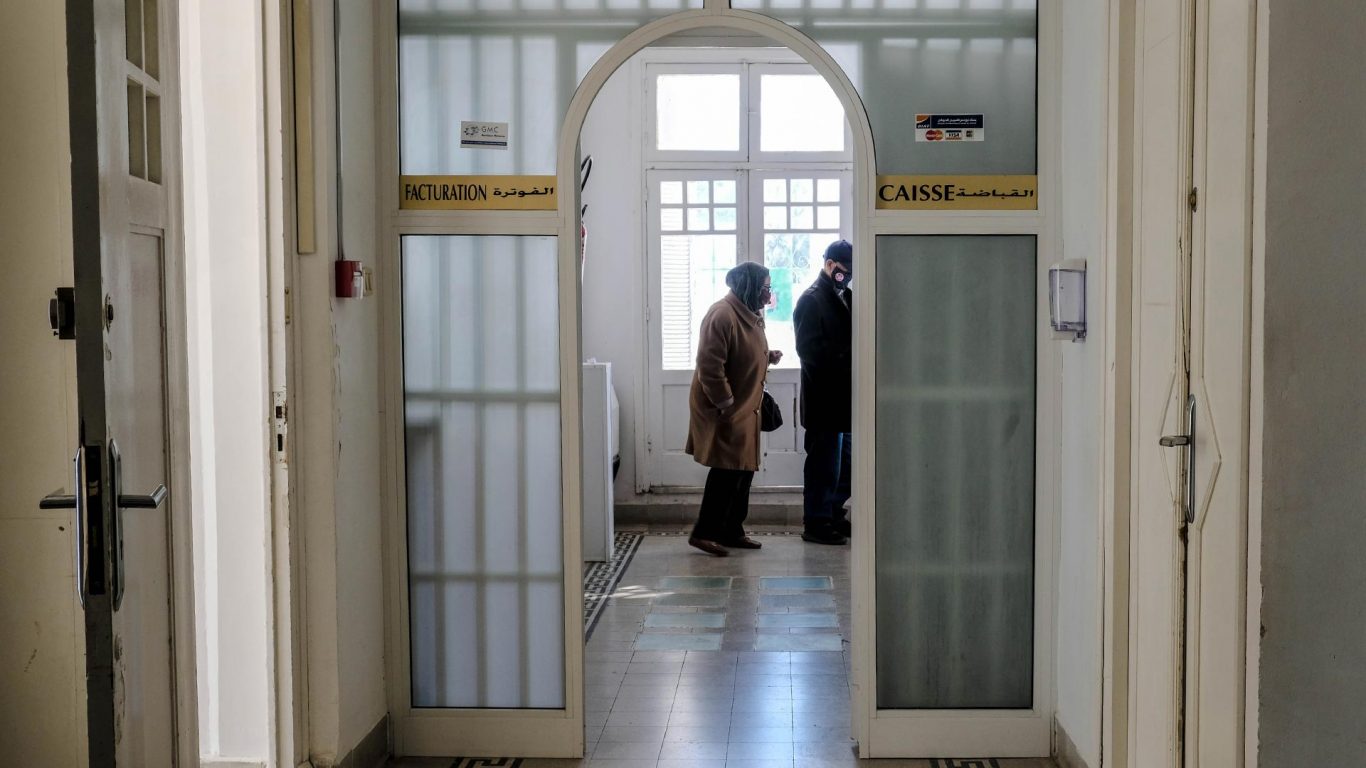Every three months, Selma goes to the Rabta hospital, in the suburbs of Tunis, to get her blood tests done, renew her prescription and get her treatment. But during the pandemic, she wasn't able to get her blood tests done because of the lack of reagents and out of fear of being contaminated by Covid-19 due to her weak immune system. According to UNAIDS, studies in England and South Africa have shown that the risk of dying from COVID-19 in HIV-positive people is twice as high as in the general population.
Like Selma, 4,500 people in Tunisia are living with HIV, according to UNAIDS estimates. However, barely half of them are receiving treatment.
Despite the existence of a national system providing free medication since the 2000s, these people do not always have access to their medication because of frequent stock-outs, not to mention the fact that the treatments are sometimes inadequate. Many of them also denounce the discrimination they are subjected to and Tunisia's delay in HIV treatment.
According to UNAIDS, only 1300 people are taking treatment. Inkyfada decided to use the more detailed figures from ATP+ and NACP.
"I don't want to remember that day"
Selma learned she was HIV-positive when she was 29. "I don't want to remember that day," she says, with a lump in her throat. "It takes me back 30 years ago, it was a complete and utter shock.” It took the 60-year-old two takes to recount the event.
"I was a sex worker in a brothel at the time," she explains. Every month, Selma made sure to get thoroughly tested for sexually transmitted diseases and infections.
In December 1992, the doctor called her back and uttered this sentence that still resonates with her. "You are no longer fit to work," he told her. "You are HIV positive”.
On the same subject
At that time, the treatments were expensive and the patient had to pay for them. "I started a treatment in 1998, my family sent it to me from France, I bought it for 750 dinars but it wasn't right for me and gave me allergies. I stopped taking the treatment until Tunisia started to receive help from the Global Fund in 2002," says Selma.
The Global Fund to Fight AIDS, Tuberculosis, and Malaria is a non-profit foundation that aims to put an end to these epidemics. Several countries receive grants, and Tunisia has received 5 million dollars for the 2019-2021 period. From its end, the Ministry of Health spends between 5 and 7 million dollars per year, according to a UN consultant.
Free yet unavailable medication
To benefit from free care, patients have access to four hospitals located in Tunis, Monastir, Sousse, and Sfax. The infectious diseases services ensure a follow-up and provide the antiretroviral treatment which aims to "numb the virus" so that it does not multiply in the blood.
"Even with the treatment, the virus is still present in the body, it is integrated in cells. But if the patient takes their treatment properly, the virus remains dormant," says Mohamed Chakroun, Head of the Department of Infectious Diseases at the Fattouma Bourguiba Hospital in Monastir.
As soon as a person learns that they are HIV-positive, they begin "first-line" treatment. These are treatments that consist of a pill, to be taken once a day. "90 to 95% of people living with HIV are on it," says the doctor.
Sometimes, the treatment is no longer effective, the body resists, the virus becomes active again and starts to multiply. The patient then takes a "second-line" treatment which is more powerful but also more constraining. Again, if the treatment does not put the virus to sleep, the patient must switch to a "third-line" treatment. According to Dr. Chakroun, as the number of pills and the number of daily doses increase, the treatment "becomes extremely expensive".
This is especially true for Selma, who is taking a third-line treatment. "I'm afraid my body will resist the treatment again," she says. She is afraid of not having a "back-up line" and of reaching the AIDS (Acquired Immune Deficiency Syndrome) stage. Indeed, AIDS is the most advanced stage of HIV infection. This means that people do not die directly from AIDS but from opportunistic infections caused by AIDS. For example, Selma had to have four ophthalmic surgeries because she developed a lymphoma in her eye.
Therefore, the purpose of treatment is to avoid the AIDS stage and to limit the spread of the virus in the body. With the treatment, the viral load can be suppressed. The person living with HIV remains HIV positive but no longer transmits the virus. HIV infection is mainly transmitted through blood, semen, vaginal secretions and breast milk.
People living with HIV have to swallow these molecules for the rest of their lives, "while waiting for research to find a medication that will reach and destroy the dormant virus", explains the doctor.
However, HIV treatments are very often out of stock in Tunisia, and some associations fighting against HIV try to get organized to acquire them from abroad. Souhaila Bensaid, President of the Tunisian Association for Positive Prevention (ATP+) has secured 47 boxes of medication from Jordan. "In April, I personally went to customs to get them out, they thought we were going to sell them", describes Souhaila, underlining the difficulties she can potentially encounter.
Risks for patients
Selma has been having a lot of trouble getting all of the medication she is supposed to be taking, especially during Covid-19, which is not without consequences. "When I take my full course of treatment, I look good, I feel good. With an incomplete treatment, my eyelids become droopy, I can hardly open my eyes, feeling tired (...), it's as if I'm broken, I feel like my body is not the same as it used to be".
"I have had enough of this. I don't have all my medication, this is serious. They should respect me!", she exclaims.
"UNAIDS encourages people to take their medication on time, not to stop treatment but at the same time we end up running out of stock", underlines Souhaila Bensaid.
ATP+ President says that these shortages are increasing the likelihood of resistance to the treatment. "There have never been as many stock-outs as there are now. The quality of care has deteriorated. HIV is not a political priority," she says.
"Given the frequency of these shortages, I get what I need from abroad," confirms Samir, who found out he was HIV-positive in 2013. Today, his viral load is undetectable and he is no longer contagious. Still, Samir remains cautious and concerned. In France, he purchased double his treatment thanks to "private contacts, [to whom] he sends the prescription".
However, this comes at a cost: one month of treatment costs him 900 dinars and Samir buys enough medication for at least three months. During the 2020 lockdown, "I found myself taking a medication that had expired three or four months ago". On a reassuring note, Dr. Mohamed Chakroun, assures that "whatever the medication, there is a safety margin after the three-month expiration date that does not expose the patient to any risk".
Who's to blame?
According to Souhaila Bensaid, the stock-outs started in 2015. That year, the Minister of Health, Saïd Aïdi was supposed to sign a framework agreement with the Global Fund. However, this took two years to be finalized. This failure has blocked the funds that finance a large part of the HIV response, including the treatment procurement.
This situation has gotten worse with the pandemic. According to Mohamed Chakroun, this began to improve in early 2021. Souhaila Bensaid points out, however, that some drugs are still out of stock, including the pediatric antiretroviral treatment.
"There are political obstructions that slow things down by six months or even a year," she notes bitterly.
The National AIDS and Sexually Transmitted Infections Control Program (NACP/STI) is managed by the Directorate of Basic Health Care at the Ministry of Health. The Coordinator of this program is in charge of ordering the medicine. The appointment of a new Coordinator - Faouzi Abid - in December 2019 has raised a great deal of hope.
"Faouzi Abid has made efforts, contacted suppliers and local partners. He sped up the administrative steps to improve the reception of these orders," says Mohamed Chakroun. "The Coordinator, Dr. Abid inherited a catastrophic management legacy on the national level," says Samir.
In an interview with inkyfada, Faouzi Abid explains that he has indeed witnessed some dysfunctions. "I did not find a security stock of antiretroviral medication," he states as an example. "The needs were poorly estimated and there was no proper management, nor a good follow-up on supervisions".
"Stock shortages are very frequent in Tunisia. This is not specific to HIV, it is due to our weak supply process, the existing administrative burden, etc. Besides, the number of patients is not high, so these orders are small. But this does not excuse the existence of stock-outs for people living with HIV, and stock-outs in general," analyses Zied Mhirsi, a public health specialist.
The Covid-19 crisis, which has severely limited the availability of medication, has brought this poor stock management to light. "Experience tells me that we must overestimate the needs and that we must have a reserve stock that would be enough for at least 6 months, some countries have nine-month stocks. We, (...) in the best of cases, have a stock between 3 and 6 months: it's not enough”. adds the Coordinator.
The current political climate is not helping the situation. "The Tunisian State is bankrupt, the State has no more money and Covid management is a higher priority and has been the focus of all efforts," says Samir.
On the same subject
A lagging treatment protocol
On top of the dysfunctions related to medication stocks, many people note Tunisia's lag in providing treatment. "Tunisia is far behind several countries," admits Mohamed Chakroun who was hired as a consultant at the Ministry of Health to oversee the updating of the treatment protocol.
For several years, the position occupied by Mohamed Chakroun remained vacant. In the absence of an intermediary to discuss new protocols with the WHO, major delays in the implementation of new treatments have occurred. "Tunisia is lagging behind! We do not change the treatment protocols as soon as there is a scientific breakthrough because it can take several years to get up to date, each time", explains Zied Mhirsi.
As for Selma, she keeps an eye on "pharmaceutical news" in the world and deplores her country's delay.
"If the Ministry of Health or the WHO were to fast-track the adoption of new generations of medicine, many people would be able to improve their quality of life. They don't realize that these lives depend on these drugs," she says impatiently.
By the end of 2020, new treatment protocols were finally validated to provide patients with less restrictive and more effective treatments, notably through the medicine "Dolutegravir". Despite this progress, the arrival of the new medication "has been delayed again and it's starting to become annoying because this treatment is supposed to solve a lot of problems", says Samir.
The current treatment has many side effects that are challenging to deal with. "I have hallucinations and I can hear my blood flow in my ears. I can't move my hands or my legs, I can't stand up. It is recommended to take it at bedtime because it makes it impossible to stand up. I've been taking the medicine for a year now and these symptoms are still present," says Hayat, with a sunken face.
Her two kids, also HIV-positive, seem to be coping better with the medication. "They're used to it, but as soon as they make an effort, as soon as they start to play, they get a little groggy from the medicine," she says.
Wassila, 33, also describes the effects of these medications on her. "I get more nervous, I can't stand any noise and I can't stand the light when I go out (...). I have no appetite and I can't sleep, my body aches."
Given the side effects, the young woman asked her doctor to change her treatment: "She told me that there was no other treatment because it was out of stock," says Wassila. Due to the unbearable side effects and the lack of alternatives, Wassila decided, on her own and without medical approval, to adjust her treatment by taking it every other week.
A painful stigma
Despite the impact of the treatment, most of those who gave their testimony insisted on the stigma that marks their daily lives. All of them shared many stories, especially involving some healthcare professionals.
Samir consulted a doctor outside of hospital facilities, "he was not human, he treated me as if I had done something terrible". At that time, Samir did not accept his HIV status: "I was mad at myself". When he noticed that Samir's medication was out of stock, the doctor told him to "manage to get it from abroad".
"I'm not the one who's been having unusual relations," blurts out the doctor.
During childbirth, Hayat recounts that "the doctor came in with a sheet of paper with HIV written on it in pink" to hang it on her bed.
Terrified at the idea that her in-laws would learn about her HIV status, the thirty-year-old stormed out of her room in tears and threatened the staff to leave the establishment, "In my social circle, only one or two people knew about it, nobody else," Hayat said. Due to her reaction and her threats, they eventually took down the sign.
Souhaila Bensaid believes that this feeling of rejection - especially by medical staff - drives patients to run away from the hospital system. This is what she calls "the loss to follow-up". The activist insists on the need to raise public awareness.
"A person who has an undetectable viral load does not transmit the virus. Healthcare providers and the whole population must know this. This is especially important because it is an integral part of prevention: we have realized that stigma and discrimination have an impact on the treatment of people living with HIV. It is essential", she insists.







